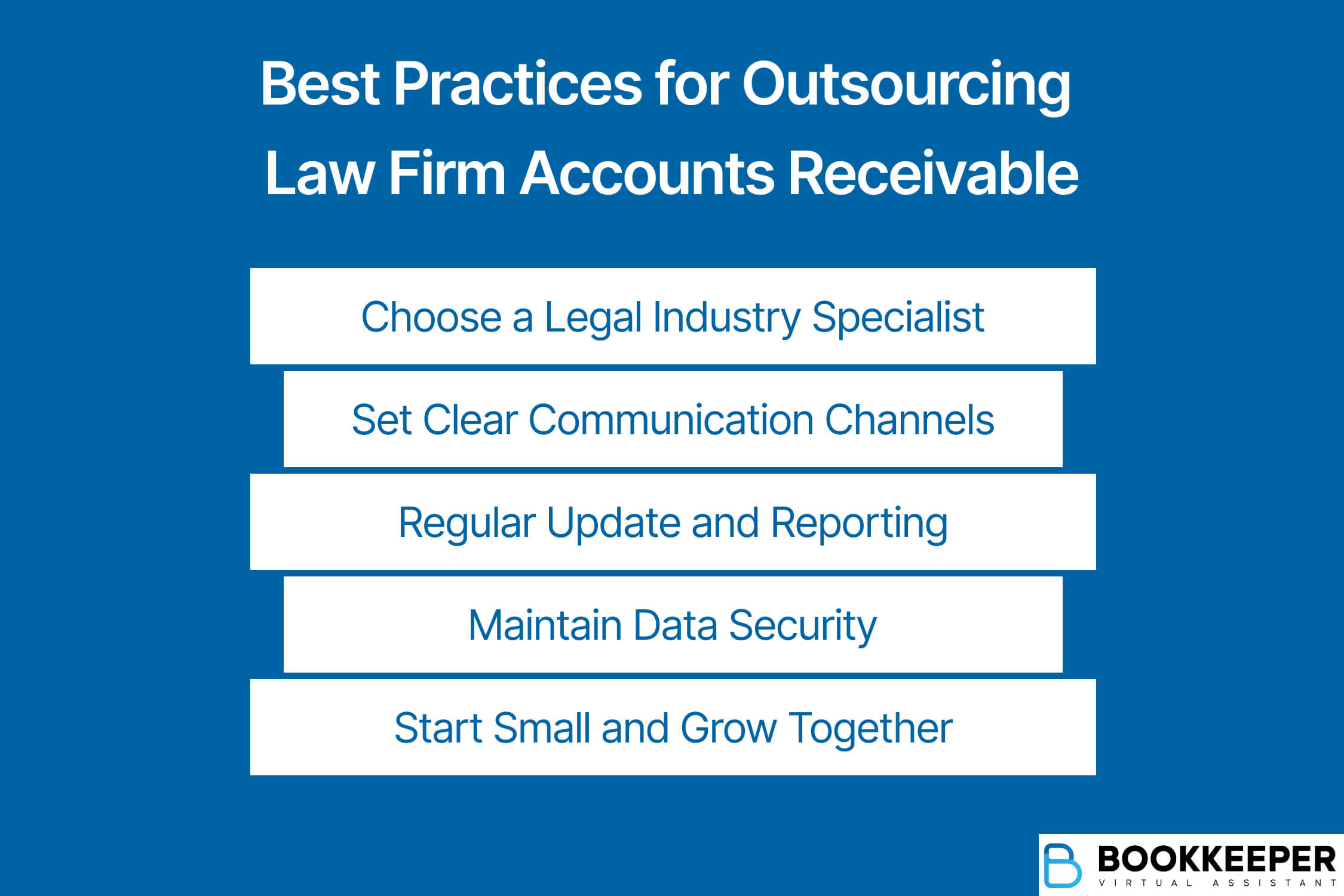Managing accounts receivable shouldn’t take time away from delivering legal services. Yet, many law firms find themselves stuck in the routine of handling receivables. Not every firm faces the same challenges or circumstances, but one thing is certain: it pulls you away from what you do best.
The solution isn’t working longer hours — it’s finding the right professionals to outsource your accounts receivable to, in a way that drives improvement and growth in your practice.
But how do you find the right fit? In this guide, we’ll explore how outsourcing accounts receivable services can transform your law firm, along with best practices for choosing the right provider.
What is Outsourced Accounts Receivable?
Outsourced accounts receivable is the practice of delegating the management of your receivables to an external provider. Instead of handling these tasks in-house, you rely on professionals who are trained and experienced in optimizing cash flow and managing payment collection.
Best Practices for Outsourcing Law Firm Accounts Receivable
Before outsourcing your AR, it’s important to take a step back and identify the approach that best aligns with your firm’s goals. This ensures you form effective partnerships that feel like an extension of your team, not an external service that operates independently.

Here are five important factors to consider before outsourcing your law firm’s accounts receivable:
1. Choose a Legal Industry Specialist
Select a service provider that understands the unique challenges of legal billing. Law firms manage trust accounts, retainers, contingency fees, and strict ethical requirements—areas that general accounting firms may not be familiar with. A provider with legal industry expertise ensures your financial processes stay compliant with regulations.
2. Establish Clear Communication Channels
Before you begin, define how and when you’ll communicate with your outsourcing partner. It’s also important to set expectations for how they will interact with your clients—including tone, messaging, and when to escalate issues to your firm. Clear communication helps maintain a professional image that reflects your firm's values and standards.
3. Regular Update and Reporting
Ensure your provider can deliver regular reports on key metrics such as collection rates, aging analysis, and other accounts receivable indicators. These data help you assess performance, track improvements, and maintain visibility into your financial health.
4. Maintain Data Security
Verify that your chosen partner has secure systems, proper encryption, and confidentiality agreements in place to protect sensitive client information. Ask about their compliance certifications and audit procedures.
5. Start Small and Grow Together
Begin with small tasks to test out rather than everything immediately—perhaps collections on aged accounts or billing. This approach lets you evaluate the provider's performance, refine processes, and build confidence before fully committing to the business relationship.
Is Outsourcing a Great Option for Law Firms?
For most law firms, outsourcing accounts receivable represents one of the highest-impact decisions you can make for your practice's financial health. It is greatly beneficial, especially for those firms facing heavy caseloads with limited administrative resources. The combination of improved cash flow, reduced administrative burden, and access to specialized expertise typically delivers returns that far exceed your initial investment.

3 of the Best Outsourcing Providers for Accounts Receivable in Law Firms
We understand that navigating the best practices for outsourcing accounts receivable (AR) can take time. That’s why we’ve compiled a list of top providers you can explore right away.
1. Bookkeeper.law
This may sound biased—but it’s not. Bookkeeper.law earns its top spot because it's the only provider on this list that focuses exclusively on law firms. Our team is made up of specialists dedicated to helping firms optimize their accounts receivable processes. With deep industry knowledge that ensures your financial systems align with legal-specific needs.

2. Legal Soft
Legal Soft offers a wide range of support services tailored to law firms, including solutions for legal operations and financial management.
3. Remote Attorneys
Remote Attorneys offers licensed legal professionals who can handle billing and financial tasks remotely. Their team is a good option for firms that need knowledgeable support in managing receivables.
What Accounts Receivable Services Can Law Firms Outsource?
When considering outsourcing, you'll find a wide range of services available to support your firm. Here's an overview of common accounts receivable functions that law firms can delegate:
Invoice Generation and Billing
Professional invoice creation and delivery using your firm's templates and branding. This includes reviewing your time entries and expenses, applying the correct rates, and working with your practice management software to ensure everything is accurate and sent on time.
Payment Tracking and Account Reconciliation
Monitoring incoming payments across all channels, applying them to the correct client accounts, and maintaining accurate records. Outsourcing this service ensures every payment is accounted for and ensures proper documentation for audit purposes.
Follow-up and Reminders on Overdue Payments
Systematic outreach to clients with outstanding balances using professional, firm-appropriate communication. This includes automated reminder sequences, personal follow-up calls, and escalation procedures that protect client relationships while encouraging payment.
Client Retainer Management
Monitoring retainer balances, coordinating replenishment requests, and ensuring compliance with trust account regulations. This prevents retainer shortfalls and maintains proper records for ethical compliance.
Financial Reporting and Analytics
Creating detailed financial reports including accounts receivable aging, collection effectiveness analysis, and cash flow forecasting. These reports provide the information you need to make smart decisions about clients and your firm.
Monthly Financial Statement Preparation
Preparing complete financial statements that accurately show your firm's financial position. This includes balance sheets, profit and loss statements, and cash flow statements that meet legal industry standards.
Payment Processing Support
Managing relationships with payment processors, handling bank transfers and credit card payments, and resolving payment processing issues. This gives your clients multiple ways to pay while reducing your administrative work.
Interest & Late Fee Management
For firms that apply interest or late fees, an outsourced service can calculate and apply these charges according to your firm's policies and legal requirements. This includes proper documentation, client communication, and coordination with your accounting systems.
Pros and Cons of Outsourcing Accounts Receivable
Pros
- Improved Cash Flow: Professional collection processes and timely follow-up typically reduce payment delays and increase the likelihood of faster client payments.
- Cost Savings: Eliminate the overhead costs associated with hiring, benefits, training, and office space for in-house AR staff.
- Saves time: Delegating accounts receivable tasks frees you and your staff to focus on legal work, not chasing payment
- Scalability: Easily adjust your AR capacity as your firm grows or experiences seasonal fluctuations without the complications of hiring or laying off employees.
- Expertise Access: Benefit from specialized knowledge and technology that would be cost-prohibitive to develop internally.
Cons
- Reduced Direct Control: Handing over financial tasks means relying on a third party, which may feel uncomfortable if you prefer hands-on oversight. However, providers like Bookkeeper.law have platforms where you can track, manage, and monitor every activity your outsourced team is doing so you stay informed.
- Client Relationship Concerns: Some clients may prefer dealing directly with your firm for billing matters.
- Data Security Considerations: You must thoroughly vet providers to ensure robust data security measures are in place to protect sensitive financial and client information.
Create a More Profitable Practice with Accounts Receivable Outsourcing
The path to a more profitable law firm isn’t always about taking on more cases or increasing your rates. Sometimes, the biggest impact comes from first optimizing the business processes that support your legal work.
Outsourcing your accounts receivable turns time spent on administrative tasks into time available for client service and business growth. It replaces inconsistent collection efforts with professional processes that improve cash flow and strengthen client relationships.
When you're confident in your cash flow and free from billing distractions, you can make decisions based on what’s best for your clients and your practice—not just what’s convenient for your bank account.





